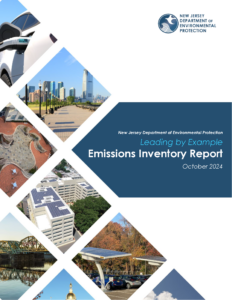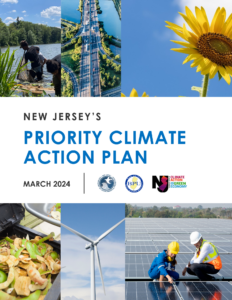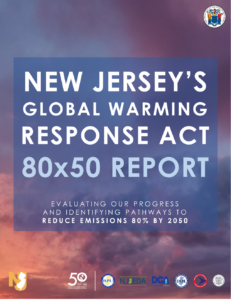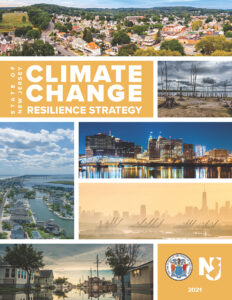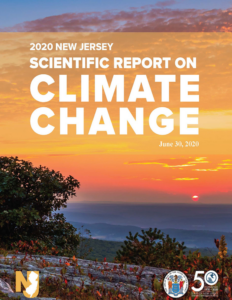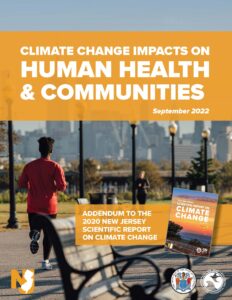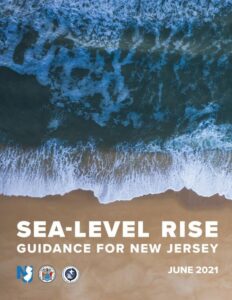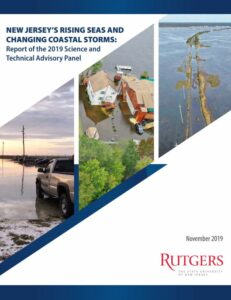
REPORTS
NJDEP Reports
Leading By Example: Emissions Inventory Report
The New Jersey Department of Environmental Protection recognizes the critical leadership role it plays in combating climate change and advancing clean energy. Achieving the State’s ambitious greenhouse gas reduction goals requires a whole-of-government approach, including decarbonizing the operations of state government itself. The Leading by Example: Emissions Inventory Report develops a baseline inventory of the Department’s buildings and vehicle stock, while also identifying opportunities to implement energy efficiency and climate mitigation projects.
New Jersey's Priority Climate Action Plan
The Priority Climate Action Plan (PCAP) is a report that includes a list of highly focused short-term, implementation-ready measures to support New Jersey’s participation in the Climate Pollution Reduction Grant (CPRG) Program. The State has analyzed and prioritized these measures to help it achieve its goal of a 50 percent reduction in greenhouse gas emissions by 2030. The PCAP includes twelve priority measures and dozens of enabling actions for those measures, grouped into the following six priority areas: transportation, buildings, electric generation, food waste, halogenated gases, and natural and working lands. The PCAP builds upon the greenhouse gas mitigation and sequestration actions already underway in the state, expanding upon those priorities to accelerate the transition away from fossil fuels and to a more sustainable future with reduced climate change impacts.
New Jersey's Global Warming Response Act (GWRA) 80x50 Report
The GWRA 80×50 Report was written in response to the mandate in the Global Warming Response Act, to reduce New Jersey’s greenhouse gas emissions by 80% from their 2006 levels by 2050. This report builds on the State’s previous efforts to address and reduce greenhouse gas emissions and serves as the third element of a comprehensive plan that evaluates New Jersey’s greenhouse gas emissions from both energy and non-energy systems, providing guidance, policies, and regulatory and legislative recommendations to meet the State’s GHG emission reduction goals.
New Jersey's Climate Change Resilience Strategy
New Jersey’s first Statewide Climate Change Resilience Strategy provides a suite of forward-looking policy options to promote the long-term resilience of New Jersey to climate change. As a framework for policy, regulatory, and operational changes, the Resilience Strategy presents actions that New Jersey’s Executive Branch can take to support the resilience of the state’s communities, economy, and infrastructure. The Resilience Strategy includes 125 recommended actions across six priority areas.
New Jersey's Scientific Report on Climate Change
DEP’s first scientific report on climate change summarizes the current state of knowledge regarding the effects of climate change on New Jersey’s environment to inform state and local decision-makers as they seek to understand and respond to the impacts of climate change. This report identifies and presents the best available science and existing data regarding the current and anticipated environmental effects of climate change globally, nationally, and regionally.
2022 Climate Change Impacts on Human Health and Communities: Addendum to the Scientific Report on Climate Change
New Jersey produced a comprehensive report on the impacts of climate change on human health and communities by adding a human health addendum to its 2020 New Jersey Scientific Report on Climate Change. Understanding how these new environmental challenges will directly and indirectly affect New Jersey residents is essential to establishing strategies that can effectively and equitably protect and improve health outcomes throughout our State.
Sea-Level Rise Guidance for New Jersey
As identified in the New Jersey Rising Seas and Changing Coastal Storms: Report of the 2019 Science and Technical Advisory Panel and the New Jersey Scientific Report on Climate Change (2020), sea-levels are increasing at a greater rate in New Jersey than other parts of the world. To address this challenge, New Jersey has developed Sea-Level Rise Guidance for New Jersey to assist local decision makers plan for and adapt to sea-level rise.
New Jersey's Rising Seas and Changing Coastal Storms: Report of the 2019 Science and Technical Advisory Panel
The Science and Technical Advisory Panel (STAP) was charged with identifying and evaluating the most current science on sea-level rise projections and changing coastal storms in New Jersey, considering the implications for the practices and policies of local and regional stakeholders, and providing practical options for stakeholders to incorporate sea-level rise science into risk-based decision processes.
 OFFICIAL SITE OF THE STATE OF NEW JERSEY
OFFICIAL SITE OF THE STATE OF NEW JERSEY